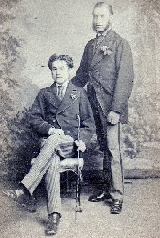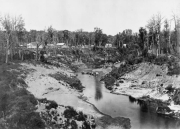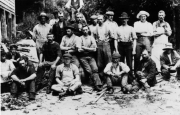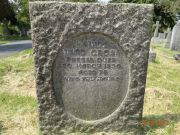
Daniel Ward Cross
BORN: Chipping Norton, England, 4 June 18511
DIED: Leamington Spa, England, 20 March 19302
Biography:
Daniel was born in Chipping Norton, the forth child of five. He had two older sisters, Charlotte and Jane, who both died soon after his birth, and an older brother, Charles. Another sister, Lotty Jane was born in 1856, when Charles was about 4 years old.
When Daniel was born, his father Augustine was employed as a labourer, but ten years later he was employed as a mail driver, as shown in the 1861 England Census. This was the Victorian equivalent of a "postie", driving a horse and cart on a local postal round in Chipping Norton and surrounding villages. The 1861 census also shows Daniel was aged 9 and attending school, but his brother Charles, although only 14, was employed as a stable boy. Stable boys cleaned stables and looked after the horses, earning £6 - £10 a year depending on age and ability. Many started as young as 10, so it is probable that Daniel would soon have left school and follow his brother.
The 1871 census lists only Augustine, Rebecca and Lotty, so we can assume that both the boys had left home. Daniel may have sailed to New Zealand in 1871. Passenger lists show a D Cross arrived in Wellington on the Electra on 16th October 1871.3
We don't know what prompted Daniel to try his luck in New Zealand but we can assume that he was influenced by the active advertising for immigrants undertaken by the New Zealand government in the early 1870s. England had been suffering from a prolonged rural depression which forced down the wages of farm labourers. The widespread disatisfaction in the countryside prompted the rise of labourers' unions as they fought to maintain their standard of living. The New Zealand government took advantage of the situation by presenting immigration to New Zealand as a solution to rural poverty and exploitation in England. Immigration agents, working on behalf of the government, worked in partnership with the unions to get the message across. One of the main areas of union activity was centered among the rural villages around Chipping Norton and Oxfordshire became an important source of immigrants during the 1870s. The history of immigration to New Zealand from rural Oxfordshire, and other counties, is well covered in Rollo Arnold's The Furthest Promised Land4.
Daniel would have been well aware of the discussions going on about the merits of migration to New Zealand. In addition, the family would certainly have been in touch over the years with their uncle Lot Cross, although there are no surviving letters from this time. It would have been reassuring that Lot, who had been in New Zealand since 1858, already has his own farm, an impossible dream for rural labourers in England. Lot's presence in the Wairarapa would have influenced Daniel's decision to move there as well.
Daniel's movements, once he arrived in New Zealand, are uncertain. He may have set up as a storekeeper in Carterton where the Hercock family was living and where he met Annie Hercock. Daniel and Annie were married at James and Maria Reid's house at Taratahi on 26 September 1876. James (Annie's uncle) and Maria were also the witnesses. Daniel was registered as being 25 years old and a storekeeper. Annie was 17 and a spinster.5 No doubt Lot and his wife Annie attended the wedding. Also in attendance would have been the large Hercock family and members of the equally large Reid family.
By 1877, Daniel and Annie were living in Taueru (now spelled Tauweru), a small bush settlement about 10 km from Masterton, where their first child Charles was born on 11 August6. Daniel owned a clothing store in Taueru and supplied clothing and "drapery goods" to the farms and sheep stations in the local area. In those days the large sheep stations employed large numbers of shepherds, cooks and blacksmiths, and were like small villages. Daniel travelled from settlement to settlement with his stock of clothes carried by packhorses. Taueru was also an important Maori centre. Daniel became a fluent Maori speaker so we can assume they were imporatant customers along with the European settlers. Daniel probably spent weeks at a time on the road, travelling with pack horses loaded with supplies and items for sale. The hills of eastern Wairarapa were still largely forested and the roads between the various settlements would have been rudimentary tracks, muddy for much of the year.
The following newspaper report (Evening Post, 7 January 1878) illustrates some of the challenges of his business:
Daniel Burke was charged with stealing money and various articles of wearing apparel, &c., the property of Daniel Cross, a storekeeper at Taueru, near Masterton.
Mr. Izard prosecuted on behalf of the Crown; prisoner was undefended.
In October last the prosecutor [Daniel] was travelling with drapery goods, &c., on pack horses. On the 9th he came to Mr. Moore's station at Glenburn, and he stayed there for the night. His packs were deposited in the men's whare, where he slept. In the breast pocket of his coat, which he hung up in the whare, was a pocket book, containing £20 in notes and several cheques. On the following day he found that the notes had been abstracted from the pocket book. His efforts to find the money were unsuccessful. Next day he missed a pair of boots and other articles. He had reason to suspect prisoner, and so he watched him during the day. In the afternoon prisoner went into the woolshed and came out soon afterwoods. Prosecutor went in immediately afterwards, and found, between some sulphur casks, several articles of drapery which had been stolen. Prisoner was discharged by Mr. Moore. He was going away when prosecutor followed him, and found in his swag several other things which had been stolen from the packs. Prisoner then pulled out the notes from the breast of his shirt, and handed them to the prosecutor, saying "Here is your money."
The jury immediately found prisoner guilty. Sentence was deferred.7
Taueru in the 1870s seems an unlikely place to be a storekeeper and begin a family. Old photographs of Taueru show little more than mud and bush, although in this respect, it was probably no different from many little settlements throughout the North Island, as the new immigrants attempted to make a life for themselves. A member of the Gazzard family, who immigrated from England recalls moving to Taueru in 1875, "...it was mud and slush round the swamp at Taueru. The driver had to whip the horses to get them out of the mud." Within a few years, however, there was a bridge across the river into town, houses, shops and businesses. These included sawmills, the blacksmith, the Taueru hotel and the Taueru Carrying Depot, owned by Annie's father William Hercock. The fact that Annie's mother and father, as well as her younger brothers and sisters, were all living in Taueru would have been the main reason for Daniel and Annie moving there also.
Then, in the early 1880s, Daniel and Annie moved back to Carterton, since Charles began school at the Carterton No 1 Boys school on 3 April 1882, the day after his fifth birthday8. However, we have no information about where they lived or what business Daniel was engaged in, although Daniel was described as a "draper" on Charles' school registration details. He probably continued travelling throughout east Wairarapa, away for weeks on end9. In July 1887, Charles' younger brother Herbert was also enrolled in Carterton School, but then both the boys moved to Clareville School at the end of 1888. The village of Clareville, to the north of Carterton, is where Annie's mother's family lived. Arthur and William were also enrolled for short times at Carterton School. By the end of 1891 the school records suggest the family had moved to Masterton, probably to Homebush, a little settlement outside of Masterton.
Behind this moving between Taueru, Carterton, Clareville and Masterton was the deteriorating relationship between Daniel and Annie. After a tempestuous relationship for a number of years they finally formally separated, a Deed of Separation and a Deed of Marriage Settlement being both completed on 19 August 1891. As part of the settlement a trust was set up which provided for Annie Cross to have use of 8 acres of land at Homebush during her life only, with the land going to the surviving children on her death10. One of the trustees of this trust was Daniel's nephew Alfred George Cross who was employed as a clerk in Masterton at the time. George, as he was more commonly known, was the son of Daniel's brother Charles and the third member of the family to migrate from England to New Zealand.
This settlement was not the end of the relationship between Daniel and Annie however, since Annie had three more children subsequent to the separation date, namely Annie (1893), Eliza (1895) and Francis (1896). But after the birth of Francis in 1896, their relationship seems to have deteriorated further and certainly became more public, aired both in the Magistrate's Court and the local newspaper.
They ceased living together. Annie continued to live at Homebush with the younger children and Daniel payed Annie an allowance for the maitenance of the children. Annie considered the amount was inadequate and we can assume she grew increasingly frustrated by Daniel's refusal to increase it. Finally, in September 1896, Annie sued Daniel in the Masterton Magistrate's Court for an increase, indicating that their relationship had deteriorated to such an extent that Annie felt justified bringing her grievances to Court.11 We are not sure of the outcome of her complaint. However the issue flared up again when Daniel became involved in a dispute between Annie and a W. H Hosking, over her failure to pay a debt of £1.8s.6p. When this dispute came to court, Daniel stated that he "considered the liability was not his as a separation order had been granted and he allowed Mrs Cross upwards of £2 per week".12 The magistrate wasn't convinced and ordered Daniel to pay back the debt, plus 10s costs. Annie expressed her indignation with Daniel by writing the following letter to the editor of the Wairarapa Daily Times:
Sir. - I see...that in Court Mr D. Cross stated that he allows me £2 per week and residence. That is misleading; he allows me 30s per week and has no interest in my residence whatever: it is my own freehold. - I am, etc, Mrs D. Cross 13
A year later in 1899, Annie charged Daniel with desertion and once again the case was heard in the Masterton Magistrates Court and reported in the Wairarapa Daily Times.14 The tone of the Court report is more sympathetic to Daniel than to Annie and after calling a number of witnesses, the magistrate dismissed the charges against Daniel and ordered Annie not to bring similar charges again. The magistrate, in summing up, said that because "Cross had well provided for the payment of six pounds per month due to the plaintiff, and considering that he had been paying the money for a number of years past regularly, it was unreasonable to expect that he intended deserting his wife".
However, it may have been reasonable for Annie to expect more from her husband than just money, however regular. While it is impossible, at this distance, to understand the reasons for their rift, the magistrate admitted that Daniel's business as a hawker meant that he was away from home for weeks on end, and Daniel had recently been living in Wellington; all his mail was being sent to the City Buffet Hotel. It can't have been easy for Annie to bring up the children on her own. In 1899 most of the children would still have been living with her, with the two youngest (Eliza and Paddy) still only 5 and 3 years old.
One of the witnesses in the court case was James Reid, probably the same Uncle James that was witness to Anne and Daniel's wedding 20 years earlier. He related a converstion he recently had with Daniel where Daniel hinted at visiting the Paris Exhibition. In retrospect, it is highly probable that Daniel was planning to return to England at this stage, as James possibly suspected.
Daniel did in fact leave soon after this, returning to England in about 1900. According to the 1901 census he was boarding in London, a widower of 49 years of age, "living on [his] own means". In September 1902, Daniel married Emma Geary in Hamstead, London15. We don't know if Emma knew of Daniel's wife and family in New Zealand, although the fact that he falsely represented himself as a widower in the 1901 census suggests that he was intent on keeping his true marital status a secret. Sometime after their marriage they moved to Leamington Spa where Daniel died in 1930. He seems to have taken the secret of his New Zealand family to his grave.
Daniel failed to write a will and after his death he was declared intestate "without issue or parent Brother or Sister...or Grandparent or Uncle or Aunt..." His estate was therefore granted to Emma Cross, as his "lawful Widow and Relict".16 In fact his marriage to Emma wasn't legal, since he had never been divorced from Annie. In addition, in 1930, his brother Charles and his sister Lotty were both alive, as were most of his children in New Zealand. It is hard to know why the High Court remained ignorant of Daniel's family situation. It suggests that Daniel had not let Emma or others know about his family and was not in contact with them. However, sometime after his death, advertisments appeared in New Zealand newspapers asking for information about the descendants of Daniel Cross. As a result of these investigations, at least a part of Daniel's estate was given to his children in New Zealand. We do not know who was responsible for this but it seems probable that somebody (possibly Charles or Lotty) heard about Daniel's death and disputed the decision of the High Court.
In Daniel's death certificate he is described as a retired grocer and provision dealer. He must have been successful since the value of his estate at the time of his death was £5613.6.3.16 £5613 would have had a purchasing power equivalent to £254,390.11 ($NZ700,000 approximately) in 2007.17
References:
- Birth Certificate for Daniel Cross
- Death Certificate for Daniel Cross
- Petone Settlers Museum Passenger Database. See also Wellington Independant October 17, 1871
- Rollo Arnold, The farthest promised land : English villagers, New Zealand immigrants of the 1870s, Wellington, N.Z. : Victoria University Press , 1981. This is also available as an online e-book.
- Marriage Certificate for Daniel Cross and Annie Hercock
- Birth Certificate for Charles Cross
- Evening Post, 7 January 1878
- New Zealand Society of Genealogists. School records compilied by Bev Towgood, Wairarapa Branch
- This is how he was described in 1899. Newspapers report a business was purchased in Tinui by a D.Cross, and another in Martinborough. However, these are probably not references to Daniel but to other unrelated Crosses.
- William Teahan, Biography: Margaret Joyce Teahan Ch 1.
- Wairarapa Daily Times September 18, 1896
- Wairarapa Daily Times August 25, 1898
- Wairarapa Daily Times August 31, 1898
- Wairarapa Daily Times August 5, 1899
- Marriage Certificate for Daniel Cross and Emma Geary
- Probate File for Daniel Cross
- Lawrence H. Officer, Purchasing Power of British Pounds from 1264 to 2007. MeasuringWorth, 2008.
- Photograph courtesy of Meagan Holland (nee Cross)




